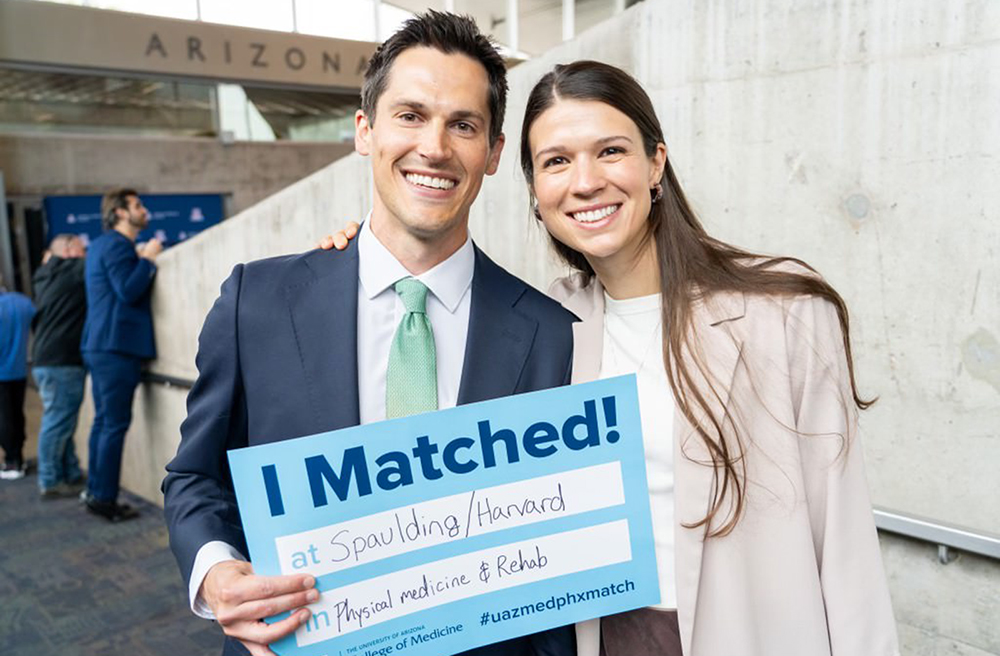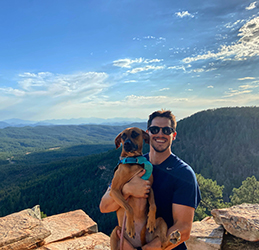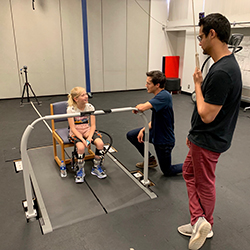
Commencement Profile: Benjamin Conner

On Monday, May 6, the University of Arizona College of Medicine – Phoenix will hold its 14th Commencement. Led by a pipe and drum corps, the Class of 2024 will process through downtown Phoenix, finishing at the Orpheum Theatre for their official ceremony. The day marks the beginning of the next phase in their journey as physicians. The college profiled a series of graduating students to commemorate the milestone.
Meet Benjamin Conner
Benjamin (Ben) Conner grew up in Central Pennsylvania and attended Penn State University for his undergraduate degree. He worked in a paleoanthropology lab that was studying bone morphology, investigating how and why humans move the way they do.
The experience ignited Ben’s interest in human movement and propelled him to earn a master’s in Biomechanics and Movement Science at the University of Delaware, where he studied musculoskeletal development and motor control in children with cerebral palsy.

Working with this patient population and engaging in more clinically focused research affirmed Conner’s desire to contribute to research that could improve quality of life. Teaming up with clinical collaborators for his research also allowed him to observe how important it was to look through a clinical lens and ask patient-centered questions.
This, ultimately, motivated Conner to pursue MD/PhD training at the University of Arizona College of Medicine – Phoenix, where he completed his dissertation on robotic gait training for children with cerebral palsy and finished four years of medical school. He credits the college with providing him excellent clinical training.
Conner’s journey to date has been catalyzed by truly excellent support, mentorship and friendships. First and foremost, he wanted to thank his parents, who set him up for success early on in life, and his wife, who encouraged him through several long years of MD/PhD training.
Lastly, Conner wanted to thank his PhD co-advisors, Zachary Lerner, PhD and Michael Kruer, MD, who entrusted him to lead clinically focused research and championed his goal of becoming a physician-scientist in PM&R.
Conner’s pursuit of an MD/PhD has been extremely rewarding and all the friends he has made throughout the process have helped to make it even more gratifying.
Match Day
On Match Day, what was it like discovering where you were headed for residency?
The buildup to Match Day was a combination of excitement and nerves. I felt good about my rank list, and while I would have been happy to match at any of the programs I had ranked, my #1 choice was my #1 for a reason!
To prepare, I had gone over the scenario of matching at several different programs in my head, considering the pros and cons of each, while also trying to trust that I would match at the program that was best for me. So, when I saw that I had matched at my first choice, I was truly elated. It felt like my efforts to date and vision for my future had all aligned, and I could not be any more excited to start my residency training now!
What’s Next?
What excites you most about your upcoming residency? Where are you headed?
I’ll be sticking around Phoenix for another year, as I complete my Preliminary Medicine Internship at Banner – University Medical Center Phoenix, and then moving to Boston, MA, for my Physical Medicine & Rehabilitation (PM&R) residency at Spaulding/Harvard.
I am most excited about taking the next step toward my ultimate career. I have been a lifelong student, literally, and I now feel ready to take on the responsibilities and opportunities of being a resident.
What inspired you to pursue this specialty?
I personally value an active lifestyle and see movement as medicine. I wanted to pursue a specialty that aligned with this perspective and gave me the opportunity to help my patients be as active and independent as possible.
I am grateful to have had great mentorship that led me toward this specialty. My late mentor, Bob Gorinski, jumpstarted my interest in rehabilitation medicine and demonstrated first-hand the rewarding profession of restoring a person’s ability to be active and independent.
Tim Ryan, PhD, at Penn State gave me the opportunity to engage in exciting research and taught me important principles of being a scientist. Christopher Modlesky, PhD, and Jeremy Crenshaw, PhD, co-mentors of my master’s program and leading experts in rehab and musculoskeletal research, gave me the tools to be a successful investigator and inspired and supported my aspirations for an MD/PhD in the field of rehabilitation.

The College of Medicine – Phoenix Culture
Looking back, what’s your favorite medical school memory?
Having spent the past seven years at the College of Medicine – Phoenix for my MD/PhD program, it is difficult for me to pick out a single favorite memory from my time here. Overall, though, my favorite memories involve the life I have been able to build alongside medicine. I moved to Phoenix without knowing a soul within a 300-mile radius, but quickly made some lifelong friends.
We enjoyed countless adventures together, bike-packing across states and hiking the Grand Canyon. We lived through a pandemic and our circle of friends became even closer (metaphorically, of course – six-feet away!). I connected to the community through volunteer work at an adaptive outdoor rec group and even spent 12 days on an adaptive rafting trip down the Colorado River during my MS3 year. I married my wife, and our close friends bought houses and started their own families. Life kept moving as my training went on, and I feel so fortunate to have been able to enjoy mine as much as I did during this time.
Earning a Dual Degree
How do you think earning an MD/PhD will benefit you most in your career as a physician? And what were some of the challenges of taking on that dual degree?
An MD/PhD combined degree program teaches you the skills necessary to bridge the gap between laboratory findings and clinical practice, and my hope is to apply these skills to my own career as a physician-scientist. Specifically, within the PM&R field, I plan to continue to help develop and test novel rehabilitation interventions and assistive devices for the patient populations that I encounter in the clinic — with a strong focus on patient-centered approaches that are practical and accessible for most individuals.
There are several challenges to MD/PhD training, and only those interested in a physician-scientist career should really consider pursuing this combined degree. My original class formed close bonds during the pre-clerkship years, so it was difficult to part ways with them as I transitioned into my PhD years. It was then bittersweet to watch them match and graduate while I was still working toward my dissertation, especially as some of them moved out of state for residency. At the same time, I was excited to have some of my original classmates as the residents I worked with once I returned for clinical rotations, and to see how far they had come in their own training.
A PhD also takes considerable work, and it was difficult to make time to stay fresh with clinical skills and medical knowledge. So, transitioning back to clerkships after years off from the clinical world was challenging. I felt like the headspace I was in for my PhD program was different from the one I would need to succeed on clinical rotations, and I was concerned that I had lost a lot of what I had learned during the pre-clerkship years. Fortunately, my pre-clerkship knowledge came back fairly quickly, and I found that while my clinical skills were rusty, the thought processes I had honed during my PhD years were incredibly useful on rotations.
So, while there were certainly challenges during MD/PhD training, there were also several upsides, and I am thankful to have experienced a journey of growth and learning.
About the College
Founded in 2007, the University of Arizona College of Medicine – Phoenix inspires and trains exemplary physicians, scientists and leaders to advance its core missions in education, research, clinical care and service to communities across Arizona. The college’s strength lies in our collaborations and partnerships with clinical affiliates, community organizations and industry sponsors. With our primary affiliate, Banner Health, we are recognized as the premier academic medical center in Phoenix. As an anchor institution of the Phoenix Bioscience Core, the college is home to signature research programs in neurosciences, cardiopulmonary diseases, immunology, informatics and metabolism. These focus areas uniquely position us to drive biomedical research and bolster economic development in the region.
As an urban institution with strong roots in rural and tribal health, the college has graduated more than 1,000 physicians and matriculates 130 students each year. Greater than 60% of matriculating students are from Arizona and many continue training at our GME sponsored residency programs, ultimately pursuing local academic and community-based opportunities. While our traditional four-year program continues to thrive, we will launch our recently approved accelerated three-year medical student curriculum with exclusive focus on primary care. This program is designed to further enhance workforce retention needs across Arizona.
The college has embarked on our strategic plan for 2025 to 2030. Learn more.